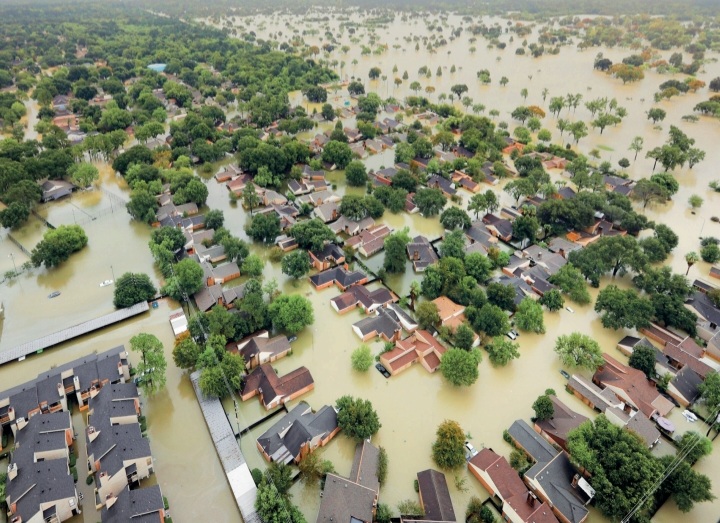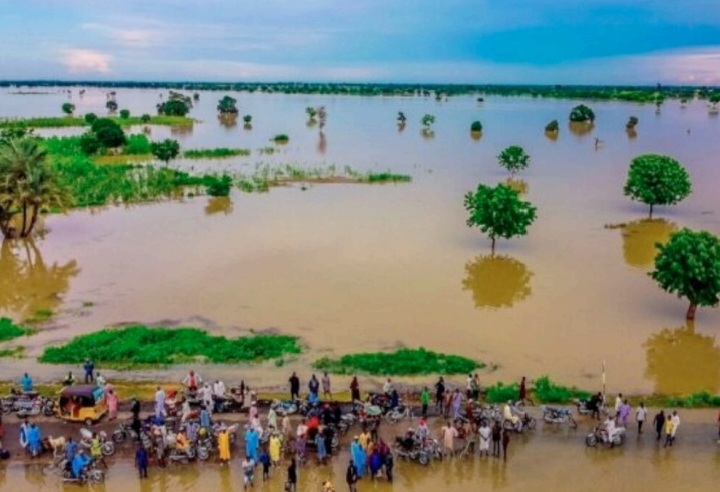Nigeria’s 2024 flood outlook: How prepared are State Govts?

By Faridat Salifu
Flood remained the most frequent natural disaster in Nigeria, with devastating impacts on the rich, the poor and the vulnerable populations who live along river courses and depend on the productivity of the river ecosystem and the fertile floodplains for their livelihood.
Like the rest of the world, Nigeria had been experiencing flood disasters with varying degree of severity, with 2012 as one of the most devastting on record. So far, the 2022 flood in the country has been tagged as the worst record flood in the country in terms of magnitude of its impact.
As flooding occurs frequently along the Niger and Benue Rivers in Nigeria, the large population situated along both rivers are usually at high risk. High rainfall, coupled with poor urban planning, inadequate and sub-standard drainage systems and lack of advanced technologies to monitor and mitigate flood are common reasons cited for flooding in the towns and cities along major rivers country.
Most of these cities and towns were developed rapidly, incurring the loss of natural soils as land areas were replaced by roads and buildings. Unregulated housing in flood prone areas in the country has significantly contributed to the flood risk.
For instnce, in 2012, heavy rainfall occured throughout the month of September cusing high volume of water to be held back in dam reservoirs. At the end of September that year, the dams were force opened and the high volume of water could no longer be contained, resulting in extensive floods across floodplains of the Niger and Benue rivers.
This resulted in extensive economic losses, damaged properties and infrastructure. That year, flooding in the Niger -Delta disrupted oil production and damaged many hectares of crops. Towards the end of October 2012, more than 2 million Nigerians had been displaced, 450 lives were lost and 400,000 houses were damaged (Reuters).
In total, 30 out of the 36 states and the Federal Capital Territory (FCT) were affected, including Lagos the commercil nerve of the nation.
To the countless villages, towns and cities that are alongside Niger and Benue Rivers banks, the August 2018 flooding is a reminder of the perennial risk that the Niger River basin poses to both Nigerians and other neighbouring countries. Checks revealed that in 2018, floods and rain left 19 people dead and 65,000 affected.

This was part of the reasons why in April 2024, the Federal Government reached out and informed various states governors of the possible flood situation to ensure the governors make the necessary preparations to effectively mitigate the impact of floods in their states.
FG writes to inform governors
On April 17, 2024, the Federal Government wrote at least 31 governors informing them of the impending flooding in their states between April and November this year.
The Minister of Water Resources and Sanitation, Prof Joseph Utsev made the disclosure in Abuja while briefing journalists on the 2024 Annual Flood Outlook for the country.
At the event, the Nigerian Hydrological Services Agency saddled with the responsibility, an agency of the Federal Government, also noted that a total of 148 local government areas in Kano, Lagos, Delta and 28 other states in the country had been categorised as high flood-risk areas.
According to the Water Resources minister, many among the 31 states listed to be affected by flood this year, were categorised as high flood-risk locations while others, including the FCT, would witness moderate flood.
The high risk states are Adamawa, Akwa-Ibom, Anambra, Bauchi, Bayelsa, Benue, Borno, Cross River, Delta, Ebonyi, Edo, Imo, Jigawa, Kano, Kaduna, Kebbi, Katsina, Kwara, Kogi, Lagos, Nasarawa, Niger, Ogun, Ondo, Osun, Oyo, Plateau Rivers, Sokoto, Taraba and Yobe.
States that would experience coastal flooding according to the minister are Bayelsa, Cross River, Delta, Lagos, Ogun, Rivers and Ondo State respectively. These states will experience coastal flooding due to the rise in sea level and tidal surge.
NatureNews findings into prepartions for this year rainfall by the governors of the flood prone states showed that some started actions to forestallany chaotic situation in their state while some are concerned more about political issues going on in their state rather than taking note of the information contained in the AFO publications sent to them by the Ministry of Water Resources and Sanitation.
Checks on the preparation of the flood prone states for the envisaged 2024 flood in the country have embarked on different activities in preparation ahead of time for such a flood forecast.
One of the states that have been doing their best in preparation for the 2024 rainfall and likely flooding, if it eventually arises is Lagos State.
The State Commissioner for Environment, Mr. Tokunbo Wahab said the state is doing its best by carrying out aggressive sensitisation and awareness campaigns, distiling blocked drainages and channels including demolition of buildings that obstructs free flow of water across the state, all in preparation for the 2024 rainfall and likely flooding, if it eventually arises.
The commissioner usually addressed the media on step-by-step being taken by the state government on the subject matter.
Benue State too was one of the flood prone areas whose government has rise up in preparations to avert any possible flooding this year.
The State Commissioner for Water Resources, Environment, and Climate Change, Odoh Ugwu, said the state government has embarked on awareness about the dangers of flooding and for people living along riversides to relocate.
According to him, a committee was set up by the government in preparation to curtail flood disasters in the state has been going round to assess structures erected along riversides and demolish those that obstructs free flow of water.
The Rivers State Government is not leaving any stone untouched while preparing for this year rainfall and its after effect. A standing committee tagged ‘Flood and Erosion Committee’ was put together by the governor of the state to ensure the state is flood free this year.
Various local government authourities in the state had identified higher grounds where they moved people who are living in flood prone areas while provision of camps for internally displaced people is considered to be put in place.
Other states such as Plateau, Osun, Edo, Kogi, Abia, Ogun and others has embarked on awareness campaign against actions such as illegal and indiscriminate waste disposal known for blocking drainage and gutters right-of-way which capable of causing avoidable flooding in their state.
Some states has embarked on clearing their waterways, dredging of notable rivers, removal of illegal structures along drainages and gutters, all in an attempt to avert possible damaging flooding this year.
Continued efforts are being made to prepare for the rainy season towards mitigating the impact of flooding across the flood prone states in the country.
However, the challenges confronting most of the flood prone states includes inadequate funding, limited infrastructure, and rapid but unplanned towns and cities.
These aside, continuous monitoring, evaluation, and adaptation of strategies are what the concerned states need to effectively address thedynamic nature of flood risk in the country, so said an environmentalsit.
